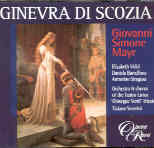This is a knockout, despite flaws in both the opera itself and the live performance. Premiered in 1801 with the great castrato Luigi Marchesi as Ariodante (here taken by a mezzo), the remarkable tenor Giacomo David (father of the famous Rossini tenor, Giovanni) as Polinesso, and soprano Teresa Bertinotti as Ginevra (whose role is composed up to a high E-natural), we can only imagine the excitement that performance generated. The opera was quite a smash and was performed regularly until about 1830. This recording was taped live at the theatre at which it was first heard, the Teatro Nuovo, Trieste, in honor of its 200th birthday.
It shows Mayr both at his best and with blemishes. The long, involved arias with chorus and the oddly-constructed solos and finales are worth studying and marveling at. Mayr’s strangest miscalculation comes in the finales: just when the music is building up a head of steam and the situations are coming to a climax, he’ll stop the ensemble with stretches of recitative! Soon after, he resumes the music and the excitement returns, but it’s very disconcerting. On the other hand, we get a gorgeous horn solo introducing a scene in the woods, and a touching violin solo (and then obbligato) before and during the heroine’s last-act aria. (Could Verdi have known this work when he was composing the lovely violin solo near the close of I Lombardi?) And, of course, there’s the virtuoso vocal writing, which is just splendid.
This performance is a thrill a minute, or at least every other minute. At almost exactly three hours it never gets around to being dull, even in its most predictable moments–quite a feat. I wouldn’t want to hear a poorly sung performance of this opera: it’s about singing. Ginevra has two high-Es and must sing with perfect legato in her first cavatina; later, she has to pull every acrobatic trick out of a coloratura’s hat–fast runs, octave leaps, staccatos–all the while expressing charm and innocence. Elizabeth Vidal is dynamite in the role. Her voice can turn a bit brittle at the very top (she interpolates a couple of high-Gs), but she’s always musical, and no matter how high the tessitura, it always sounds human and articulate.
Daniella Barcellona as Ariodante is likewise remarkable. Her first aria takes her the two octaves upward from C below middle-C, each tone is rich and full, she’s involved in this heroic part, her voice is gloriously produced and handsome in timbre. This new mezzo has impressed in recent recordings; here she’s magnificent. Tenor Antonino Siragusa is the villain Polinesso, and he’s fluent and fearless. He must show great hypocrisy in the second act and Siragusa proves that he’s more than just another pretty voice; he’s snide, believable, and exciting. The tone can turn throaty at times, but every note in his low-B to high-C range is real. Marco Lazzara is a male soprano with a strange, piercing sound that you get used to; he slurs a run or two in his first-act scena, but otherwise he’s another great asset. Luca Grassi imbues the role of the King with nice depth. The all-male chorus is excellent.
This recording was taken from a live performance (or two or three), and while there are occasional flubs in the orchestra, they’re of slight importance, and the audience’s coughing only occasionally gets in the way. Tiziano Severini leads this long, complex score as if it were a great work, which on some levels it is. The sound is excellent. No fans of bel canto, lovers of Italian opera, or those curious about Donizetti’s teacher should be without this.
































